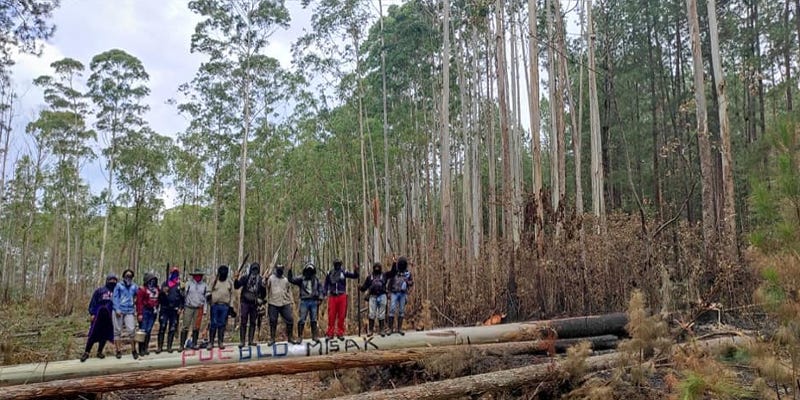Smurfit Kappa is destroying Indigenous Peoples’ land in Colombia while claiming to be “sustainable”. Instead of supporting Indigenous Peoples’ rights, WWF and FSC are helping to greenwash the destruct

On 13 January 2022, the Smurfit Kappa Group, one of Europe’s largest packaging companies, announced that its emissions reduction targets have been approved by the Science Based Targets Initiative (SBTi) as consistent with the Paris Agreement. According to SBTi, “Smurfit Kappa Group commits to reduce scope 1 and 2 GHG emissions 37.7% per ton of saleable production by 2030 from a 2019 base year.”
The Science Based Targets Initiative was set up by CDP (the NGO formerly known as the Carbon Disclosure Project), the UN Global Compact, World Resources Institute, and WWF. Almost 1,200 companies have made commitments to emission reductions in line with 1.5°C global heating by 2030.
In the press release about SBTi approving Smurfit Kappa’s carbon reduction target, Tony Smurfit, CEO of the Smurfit Kappa Group says that, “Sustainability is at the heart of all our operations, and we have a long-term commitment to protect the planet, its people and all our stakeholders.”
Smurfit Kappa’s greenwash
The reality is that Smurfit Kappa’s operations are far from “sustainable”.
In Colombia, the company controls 67,270 hectares of which just over 42,000 hectares are industrial tree plantations of pine and eucayptus.
Here’s how a 2020 article in the World Rainforest Movement Bulletin describes how Smurfit Kappa established its monocultures on Indigenous Peoples’ land:
In 1978 the Pulpapel company — now known as SKCC [Smurfit Kappa Cartón de Colombia] — started purchasing land in the department of Cauca, in order to introduce and expand pine tree cultivation in this territory. Some of these properties were in the process of being reclaimed by indigenous paeces communities, who consider this to be ancestral territory. These claims had been ongoing since the 1960s. The indigenous people occupied these properties in order to expel the multinational corporation from their territory. This was also to prevent the expansion of this monoculture, given that in a short amount of time, the multinational company had installed eucalyptus trees in an area of approximately 1000 hectares. These communities witnessed the destruction of native forests and their replacement with timber plantations (eucalyptus and pine).
The army violently evicted Indigenous People from their land to make way for the company’s monocultures.
The Indigenous Misak people, the Nasa people and other communities have lived in the Cauca region in southern Colombia for thousands of years. When Ricardo Carrere of WRM visited the area in 2003, the people living near the plantations told him that,
“the plantations have finished off the water,” that “spraying has finished with everything there was in the soil,” that “there is hardly any fauna left,” that there used to be “clouds of birds” and that now “only in the summer does some bird appear, but not in winter time,” and that “there are no fish left either.”
Regarding employment, they reported “all the work is seasonal” (it is outsourced) and that “the contract implies working for two and earning for one.” Like in the jungle, only the fittest survive: “if you don’t reach production, they remove you, you can’t be over 40 and we all have to be strong to reach that production.” Regarding worker organization, not only is there no trade union, but “he who grumbles is out” and “here no comments are made.”
Smurfit Kappa: stop destroying Indigenous land in Colombia
The Indigenous Misak people have been struggling against Smurfit Kappa for many years. The company has relied on Colombian security forces to stop their protests.
In August 2021, a young man, Huver Samir Camayo, was shot dead while protesting against Smurfit Kappa’s operations in the region. He was transferred to San José de Popayán hospital, but died from his wounds.
Two days after his murder, the community held a funeral for Huver Samir Camayo, and demonstrated against the police. They attacked the police station and set fire to the mayor’s office in Cajibío.
SumOfUs has set up a petition demanding that Smurfit Kappa gives the lands of the region of the Cauca back to the Misak community. Click on the image below to add your name to the more than 140,000 signatures:
WWF has partnered with Smurfit Kappa
In 2020, WWF Colombia jumped into bed with Smurfit Kappa. The “new alliance” is supposedly “to improve forestry conservation”, but the reality is that it’s just more greenwash.
The alliance does clearly illustrate, however, whose side WWF is on when it comes to a destructive corporation with lots of money and Indigenous communities who have seen their lands invaded by monoculture tree plantations.
Nevertheless, Sandra Valenzuela, WWF Colombia’s Chief Operating Officer says,
Since 1961, the WWF has worked to develop innovative solutions that protect people, communities and wildlife so we are delighted to have formed this partnership with Smurfit Kappa Colombia.
Even given WWF’s record of corporate obsequiousness, this is ridiculous. Industrial tree plantations do not protect people, communities, and wildlife. They actually threaten to destroy all three.
Smurfit Kappa’s plantations in Colombia are FSC-certified
Since 2003, Smurfit Kappa’s destructive monoculture plantations have been certified as well managed under the Forest Stewardship Council system.
In 2006, more than 120 organisations and people in Colombia wrote to FSC demanding the “immediate de-certification of the plantations owned by Smurfit Kappa Cartón de Colombia”. At the time, FSC was carrying out a review of its plantation certification policy and the authors of the letter hoped that “the result of this process will be an end to the certification of these types of plantations by the FSC in the future.”
Needless to say, that didn’t happen, and Smurfit Kappa’s industrial tree plantations in Colombia remain FSC certified to this day.








